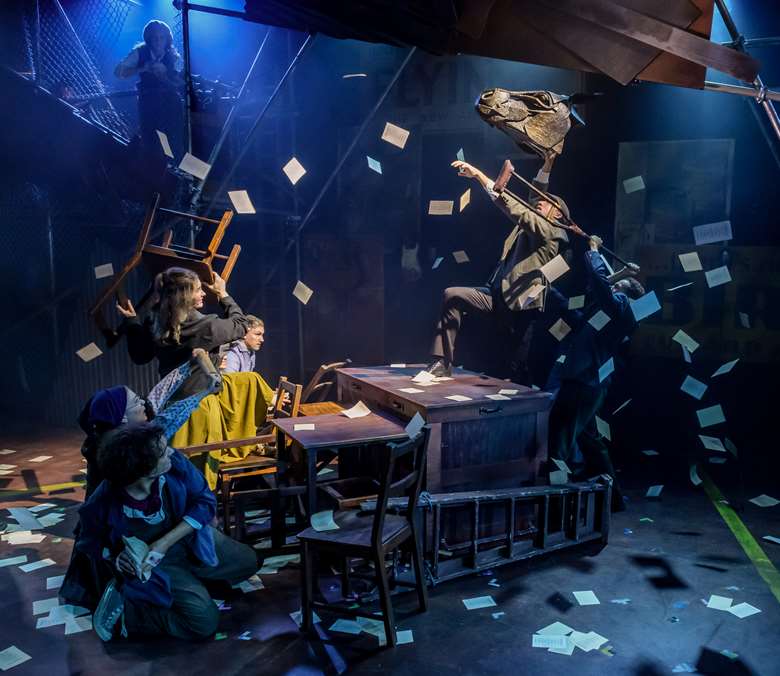Cable Street | Review
Aliya Al-Hassan
Friday, September 13, 2024
As the new musical by Tim Gilvin and Alex Kanefsky returns to Southwark Playhouse, this time to its Elephant venue, we share our original review from February this year, in which Aliya Al-Hassan applauds the timely and inventive depiction of how Oswald Mosley’s fascist party was thwarted during its march into London’s East End in 1936 by a group of working-class Jews, Irish dockers and Communists

In the current climate, where antisemitism is on the rise and anti-immigration rhetoric is top of the political agenda, Adam Lenson’s staging of Cable Street could hardly have more resonance.
It’s set during the Battle of Cable Street in 1936, when Oswald Mosley’s British Union of Fascists (BUF) marched into London’s East End to stir up anti-Jewish sentiment. He was blocked by a group including working-class Jews, Irish dockers and Communists, who all united to insist that Mosley’s cohort ‘shall not pass’.
Cable Street focuses on three young people and their families, living, fighting and working in London’s East End as the threat of fascism looms overhead: Ron, a Lancashire lad looking for work, who becomes embroiled with Mosley’s fascists; Sammy, an ambitious Jew facing unending discrimination; and Mairaid, an Irish Catholic girl inspired by the promises of Communism.

Sha Dessi’s Mairaid gives us some of the most impressive vocals of the night, showing great clarity and power. This is particularly strong in rock-influenced ‘What Next?’ – a rallying cry to her community to stop looking to the past, with clever guitar riffs merging with an atmospheric Irish fiddle.
Danny Colligan brings nuance and realism to Ron, pulled towards an ideology that promises him work and security. The character could be more fleshed out, but Colligan shows some strong and steady vocals, particularly in an emotional rendition of ‘Shut Me Out’ where he reflects on being rejected by the BUF.
Recent graduate Joshua Ginsberg makes a solid debut as the hopeful Sammy, both likeable and energetic. Ginsberg has a tricky task, with a Hamilton-style hip-hop theme assigned to his character, but manages to keep up with the sometimes breakneck speed of the delivery.

The show feels like a team effort; the rousing ‘My Street’ showcases lovely harmonies from the cast, and ‘Sunrise’ is a wonderfully energetic celebration of the power of community.
The versatility of the cast is also very impressive. Jez Unwin slips seamlessly between a present-day tour guide, Blackshirt leader and Sammy’s devout father Yitzhak. The wonderful Debbie Chazen (sadly underused) shows huge flexibility as an American tourist, an Irish mammy, a Cockney police officer and a Yiddish granny, all presented within seconds of each other. And cast members Max Alexander Taylor and Aoife Mac Namara double up with accomplished guitar- and violin-playing respectively.
Composer and lyricist Tim Gilvin reflects the cultural melting pot of Cable Street itself, with a score that is a fusion of musical styles, including hip hop, music hall, Irish folk, klezmer and modern pop, along with Spanish melodies – a nod to the influence of the anti-fascists of the Spanish Civil War, who used ‘no pasarán’ (they shall not pass) as their slogan.

The show runs the gamut of emotions with its songs, from the standout closer to Act One, ‘No Pasarán’, to the witty, Sondheim-esque musings of a quartet of newspaper sellers, to a cheekily subversive BUF anthem coming straight from a noughties boy band, complete with Jevan Howard-Jones’s camp dance routine and smoke machine.
Cable Street is Alex Kanefsky’s first full-length musical and his book could do with tightening; the first act takes time to settle and feels overly long. A burgeoning love story between Sammy and Mairaid never truly gets going, nor does the rivalry between Sammy and Ron which we really need to get completely swept up in in the dramatic finale. The upbeat ending to the show also feels a little glib, coming after a passing reference to the ‘Pogrom of Mile End’, the worst incident of anti-Jewish violence in Britain during the interwar period, which occurred just a week after the events on Cable Street.
Anybody who attempts to stage a new British musical in the current climate deserves a huge amount of praise. Cable Street is not perfect yet, but it has all the ingredients to become a rousing success.

PRODUCTION CREDITS
Cable Street by Tim Gilvin (music, lyrics) and Alex Kanefsky (book)
Southwark Playhouse Elephant, London - please note that this review is of the production at Southwark Playhouse Borough in February 2024; the cast has since been slightly amended, as have various plot points and relationship dynamics)
Starring Joshua Ginsberg, Sha Dessi, Danny Colligan, Jez Unwin et al
Directed by Adam Lenson
Cable Street runs until 10 October 2024 – visit southwarkplayhouse.co.uk
This article features in the April/May 2024 issue of Musicals – consider subscribing today!